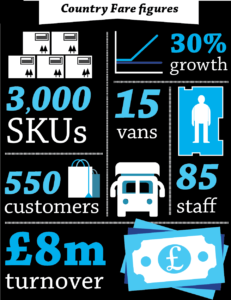Gavin Millward’s path into wholesale was anything but linear.
Millward grew up in South Africa and originally trained as a teacher. He and his wife, Debbie, came to Europe on their honeymoon for a backpacking adventure, before settling in the UK after Millward began working in the City in IT. Five successful years later, he elected to move into wholesale, buying a business in Bournemouth.
Asked about his career change, Millward says: “I got tired of travelling to Europe, and sleeping in hotels. We loved the coast when we came to Dorset on holiday and decided we wanted to live here. Six months later, we had sold our house in London, and I’d given up my job, and bought the business.
“I wanted to do something fairly local and I have always had a passion for food. I was enticed by the fact this business had the foodie element to it and that continues to drive me.”
Country Fare, as the business is now known, has a focus on fresh produce and fine foods. It serves hotels, pubs, restaurants, nursing homes and schools, among other customers, in the Dorset area as well as parts of Hampshire. Fuelled by Millward’s drive, Country Fare sets itself apart from its competitors in more ways than one.
Millward says: “A lot of wholesalers’ customers are numbers on a page. But ours aren’t. For example, we pay for our chefs to go on site-tours to where their products come from, so they can understand the production cycle and so on.
“We invest a lot of time and money in our customer base so that they can be empowered with what they learn. End-users have settled for receiving a level of service that they feel is the norm. So, they get goods that are not top quality, and substandard service and delivery times. They settle for it, because that’s how they believe things are. That’s where we differ, and it makes us much more than a wholesaler shifting a product from A to B.”
The business is looking at introducing a development kitchen to help its customers, and is also keen on launching a new app. It recently trademarked the phrase ‘Fresh Thinking’, relating to its focus on fresh produce and its unique approach to wholesaling, in an attempt to ensure that it continues to stay ahead of its competitors.
Millward notes: “I don’t want to say this is a boring industry, because it’s not, but there are many people in it without much initiative.”
He has been at the helm of Country Fare for 13 years now. “When I took it on, it was from an older chap who used to have a fruit and veg stall called The Cabbage Patch,” he says. “He had started supplying hotels and restaurants on the back of that, and then moved into a little warehouse with about eight or nine employees, and fewer than 100 customers.
“Debbie and I have changed it from being a greengrocer, to being a foodservice company, and then to where we are now with the added-value.”
Country Fare aims to sell everything and anything that a kitchen uses on a daily basis with the exception of meat and fish. It has around 550 customers, 3,000 SKUs, 85 staff and 15 vans, with two more vehicles on the way.
Everything beyond fresh produce accounts for around 40% of sales. It’s these areas that Millward and his team want to boost: “A lot of chefs only use us for fresh as that’s all that they know us for,” he admits. It is hoped that a push in marketing and sales will achieve more wins here.
In the past few years, Country Fare’s growth has consistently been in double figures and more of the same is expected this year. Millward puts this down to high service levels and quality, which have been vital given that the sales team has never been huge. He has now reinforced that department, and Country Fare has upped the ante on social media and digital marketing.
While the UK foodservice giants are a threat, Millward believes his business’ service levels continue to negate this.
 Landmark Wholesale will play its part, too. Millward says: “Despite being a member for a few years, we have only really accessed what Landmark offers us in the past 12 months. The more we tap into it, the more the value of it becomes fantastic. Before joining Landmark, it was difficult to get the right price when buying dairy, ambient and frozen goods, especially when we entered, as we only wanted a small quantity.”
Landmark Wholesale will play its part, too. Millward says: “Despite being a member for a few years, we have only really accessed what Landmark offers us in the past 12 months. The more we tap into it, the more the value of it becomes fantastic. Before joining Landmark, it was difficult to get the right price when buying dairy, ambient and frozen goods, especially when we entered, as we only wanted a small quantity.”
A new home is one of Millward’s next goals. Country Fare is outgrowing its present site and it will start looking for larger premises in Dorset soon. However, there are no plans to expand beyond one, bigger site.
This is because quality remains key. And underpinning this is the progression of staff. Millward has recently formulated five core values for the company, aimed at helping staff to continue to strive for greatness. He has also lined up 500 hours of external training across the firm this year to help his team develop their skillset: “We believe if our staff are happy and knowledgeable, then our customers will be, too,” he says. “Employing the right people has been a challenge along the way. But we believe training and core values will help us tackle this.”
Gluten-free products have grown in importance for Country Fare’s customers, as have so-called superfoods, and the business is also catering for a number of new vegan restaurants and smoothie bars.
Provenance remains an important consideration in Dorset, which has a food-rich heritage. One of the ways Country Fare helps its customers here, while keeping costs down, is by getting its drivers to call in on local farms to pick up produce on the return leg of their delivery journeys.
“By doing that, we are saving on transport costs for our products. That means local can be cheaper when it’s done like this,” Millward says.
His vision for the future and his desire to achieve it are both clear: “We want to keep being a happy company with fresh ideas, and we want to maintain a close relationship with our customers,” Millward says. “We need to remain profitable, because I am always investing in the business to improve it. I invested to improve our office space – I didn’t have to do that, but I felt it was necessary to create a better working environment. I invested in a roof covering the drivers’ trucks, so they don’t have to load up in the rain. Are these things essential to run the business? No. Do they make it a better business? Yes.”








